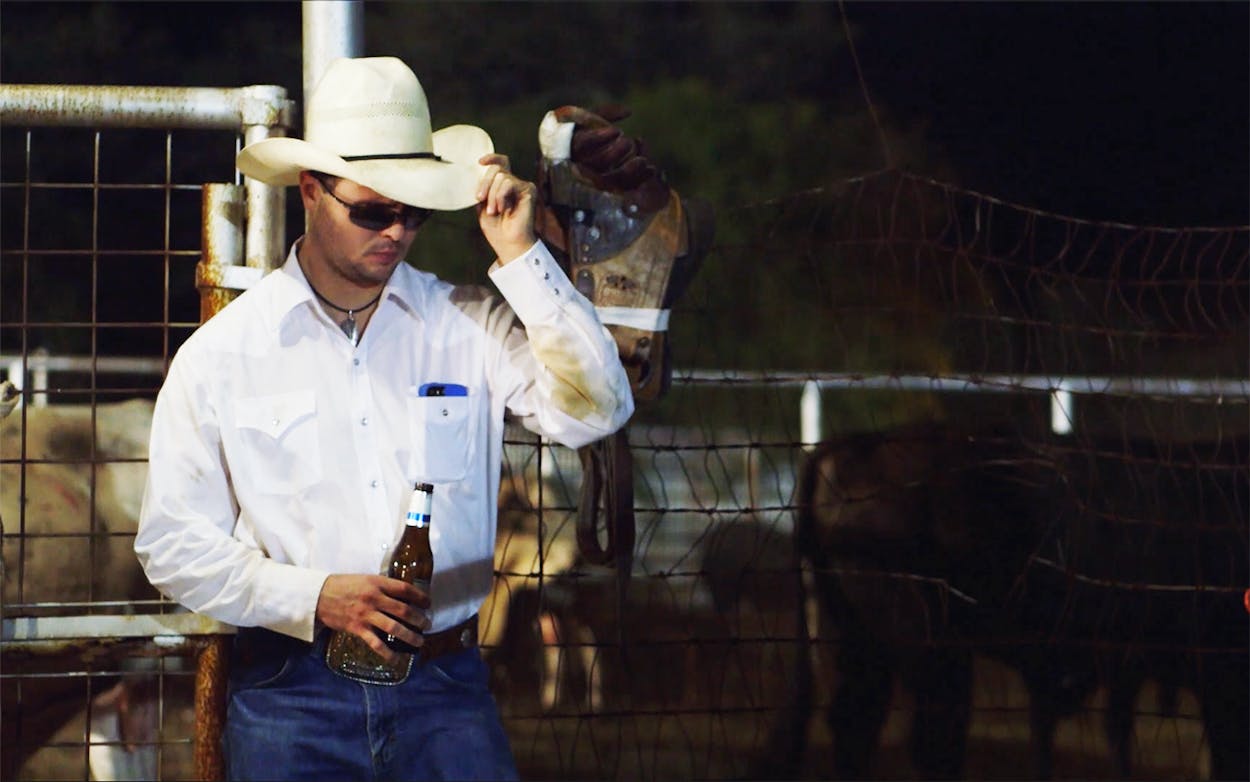As a young man growing up in Kerrville, Mac Coleman knew he wanted to be a professional bronc rider. After winning regional championships in high school and earning a college bronc-riding scholarship, he was well on his way—until Coleman was shot in the face three times with a shotgun. The nineteen-year-old lost his sight, but years later, he started to ride broncs again. In All Around, filmmaker TJ Martinez, then a student in the Department of Radio Television Film at the Moody College of Communication at UT Austin, told Coleman’s story over a season of bronc-riding. Watch the short film here, and read more about Martinez’s process below.
Texas Monthly: How did you first hear about Mac Coleman?
TJ Martinez: It was really lucky, actually. My dad used to be a professional bull rider, years ago, before I was born. I grew up in New Mexico, but while I was living in Austin getting my MFA at UT, my parents came to visit me. One of my dad’s old rodeo buddies happened to be living in Kerrville, so they went to see him too. A couple months after that, he sent me a text and said, “Oh yeah, I’ve been meaning to tell you—there’s this guy who rides broncs and he’s blind. That might make for a good movie.” It turns out Mac is the son-in-law of my dad’s old rodeo buddy. Then I had a good conversation with Mac, and he seemed pretty open to a movie.
TM: The film is more of a meditation on Coleman’s life than a straightforward biopic. How did you decide how to structure it?
TJM: When I was filming at all of these rodeos, I thought about following a couple of these guys and using the structure of the rodeo season, competing to see who wins best all-around cowboy, which is who wins the most points per season in two or more events. But that’s kind of a clichéd sports story. I wanted it to be a slower, more thoughtful film about Mac and blindness. That’s more interesting, but it also makes it a little harder to construct.
TM: How did you decide how to address the shooting, and what happened to Coleman? What was that conversation with him like?
TJM: Because I had waited so long to talk to Mac about it, I had built up this big moment in my mind, where he was just going to go to the life-changing depths of depression and inner-demon type stuff. But he was really matter-of-fact about it, which is kind of amazing. He’s totally come to peace with it. He doesn’t dwell on it: He was depressed for a while, he was angry for a while, and then meeting his wife had a lot to do with him coming to peace with it. He’s a Texas cowboy, so he doesn’t use showy words. He’s more straightforward: all right, it happened. I used to see, now I can’t. It was kind of anticlimactic.
TM: What was that like as a filmmaker? I imagine that conversation was an important part of the film.
TJM: When I was interviewing him, waiting for a really good moment where he talks about it, my heart was sinking, because I was like, this isn’t good drama! But ultimately, you can only make the movie that you have the footage of. Instead of a dramatic thing, it became more of a meditative piece on transformation: the idea of being forced to change and what that does to you and how it changes how you approach life. That’s something that I wanted to bring out in the film—how it had changed him as a person, ultimately for the better. Mac is a more open-minded person, more accepting of others, more calm, less angry. He notices what’s going on in the world around him and takes it in more. The film became ultimately about that, rather than about this dramatic moment when he lost his eyesight.
TM: It seems like it wasn’t the film you originally envisioned, but a more honest telling of his story.
TJM: I think so. I struck down the idea of doing a sports narrative pretty quickly because that would have been taking the easy way out, and it would have been a missed opportunity to take a more nuanced, subtle look at an ordinary dude who had this really bad thing happen to him, and how that changed him. That’s more interesting to me than some souped-up drama of a sports story.
This interview has been edited for clarity and length.






